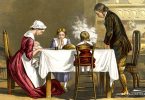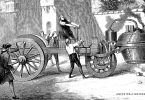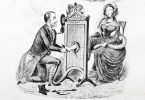The decade of the 1780s are considered to be a transitional one between the end of the Age of Enlightenment and the beginning of the Industrial Revolution. This decade saw the creation of modern philosophy, the abolishment of monarchies, the establishment of democracies, and a plethora of inventions and discoveries that shaped the modern world we now enjoy. These are some of the highlights of the 1780s that your ancestors may have known about, or even got to experience personally, whether bad or good.
Inventions and Discoveries
One of the top discoveries in this decade came in the field of astronomy with the discovery of the planet Uranus. Humans took flight in a controlled, guided way for the first time with the invention of hot air balloons. Cast iron was invented and put into commercial use, such as in the well-known cast iron skillet that most of our grandmothers and great-grandmothers owned.
The American Revolution
Naturally, the American Revolution was one of the biggest world events happening in this decade. No other country in the known history of the world had done what the former British colonies were doing. They were not only pushing back and rebelling against their parent country, but they were establishing a new country of their own, inventing the form of government it would take as they went along the route to independence.
France played a large role in helping the colonists win the conflict, and it was the lessons in gaining independence that the French people learned from America that encouraged them to overthrow the monarchy and establish their own democracy in the French Revolution a decade later.
In the News
Attempts to give British citizens some more independence and freedom didn’t go over as well in the mother country. In this decade, in Great Britain, the Duke of Richmond asked the House of Lords in parliament to grant universal suffrage for all men who had reached the age of majority, and for annual parliaments, but this request was rejected.
Ireland hires a lady executioner, which was an unusual thing in Europe, and the circumstances of how it came to be were even more unusual. Lady Berry was sentenced to execution for murdering her son. Yet, she was reprieved and released from prison when she agreed to become an executioner herself. She served in this capacity for nearly thirty years, retiring in 1810.
Also in Ireland, the world famous Jameson Irish Whiskey distillery was founded in Dublin, Ireland.
The Siku Quanshu was completed in China. This was the largest compilation of literature in the history of China. The books in the collection include almost 37,000 volumes, 79,000 chapters, and 2.3 million pages. There are about 800 million Chinese characters in the collection. There were numerous books on philosophy published in Great Britain, America, and in other places in Europe. Modern philosophy was a big topic of discussion in all the intellectual gathering places, and many of these works are still studied today.




